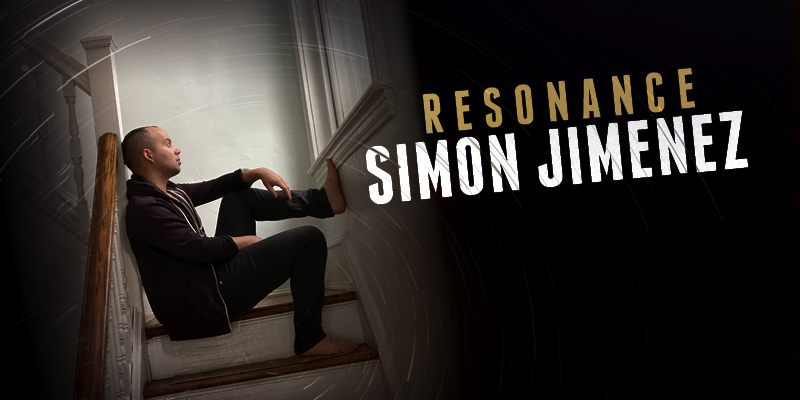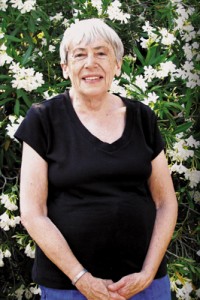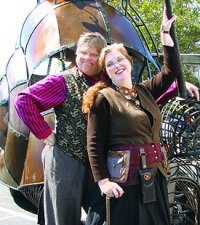Simon Jimenez: Resonance

Simon Emmanuel Jimenez is a Filipino-American author born in 1989. He spent time in Canada and the Philippines growing up, and attended Emerson College, where he earned an MFA in creative writing.
Jimenez has published short fiction in literary venues. Debut novel The Vanished Birds appeared in 2020, and was a finalist for the Arthur C. Clarke Award and a British Fantasy Award. Epic fantasy novel The Spear Cuts Through Water is forthcoming. Jimenez was a finalist for the Astounding Award for Best New Writer in 2021.
Excerpt from the interview:
“Intimacy and connection are things my work will always include. They’re very important issues for me – exploring what it means to be close to someone, and the transformations of a relationship over time, are of deep interest to me. I think only more so the more I write, because writing is such a lonely experience. It may not be something I am cut out for, in the long term.
“The theme of music crops up in a lot of my work. I grew up in a house of music: all my siblings had to take piano lessons, and piano became something that followed me through really formative periods of my life, as a kid, and then a teenager. Music accompanied me through really brambly periods of my life, and became very much a part of me – in both good and bad ways, or ways that are not emotionally positive, but the connection is there. There’s a lot about music and its creation process that can be emotionally complicated. Even just listening to it can be complicated, depending on the situation, not only because someone might just be bad at playing it, but because the intention of the musician might be to create some kind of discomfort. Like any kind of art, there’s a lot of different intentions to any given piece. But also, to create music is to put yourself through a really difficult process – practicing, having discipline, and just being present every day and coming back to the work and honing it. When you’re a kid and you want to watch Pokémon, maintaining that kind of discipline is really annoying. Also, your relationship to your teacher or tutor or whoever is very interesting. It can be a fraught relationship, because they’re being paid to teach you this craft or skill, and sometimes you don’t want to be there. Sometimes you love it and sometimes you hate it, and as a kid you’re kind-of a volcano of emotion, and they’re an adult with their own shit going on, and that can clash, too. All that stuff is in the back of my head, being worked out every now and then in fiction.
“There’s always a panic when you’re writing towards the end of a story you haven’t rigorously outlined. You have an idea of where you’re trying to go, but you need to think of a way to wrap up the plot and also make it thematically resonant. It’s very anxiety-inducing when you haven’t really thought that out beforehand – you’re kind-of laying tracks as you go. But I also don’t know if it would be better for me, personally, to do it the other way around, where I really plan things out. I don’t know if that would produce a better result or not. I think I would be afraid of getting bored of the work, or robbing it of some kind of fire. I know both methods can create anxiety. This last six years of just writing books has taken a toll on my insecurities and self-esteem.
“Generally I stay off social media. I think this is a good thing for me emotionally, but it also means I’m very out of touch, compared to my friends. They’re used to it by now. I don’t know anything. Every now and then I’ll make the mistake of typing my name on Twitter and seeing what comes up, but mostly I get politicians from a different country, so it doesn’t really matter – it’s some other Simon Jimenez out there. But for the most part, from what I’ve been shown and what I’ve seen for myself, it sounds like the reception to my work is pretty nice. That’s lucky. I’m happy that I don’t have to deal with that world. I’m not on Twitter, so I’m not just giving free shots for anyone who doesn’t like my work to punch me in the face.
“I don’t think I had a favorite character in The Vanished Birds. Inasmuch as I had any fun writing this book, which was not a lot, I had the most fun maybe writing the first chapter and Fumiko’s intro. My natural register when I’m writing is very character-based, with a narrator sweeping through time, kind of like bottling a life – I can do that very easily. I had kind of a panic when I was writing – I was like, ‘Shouldn’t Fumiko be in the book more?’ I couldn’t figure out a way to get her in. My original vision had her being more involved in the plot on the Debby. I think it reads okay anyway, with her being so absent. I also enjoyed writing Sartoris’s diary chapters, I think mostly because writing first person takes off so much pressure from me as a writer. Here is a voice and a point of view and a set of rules for you to follow. I would like to write more first-person stuff. Also, with the Sartoris section, I related to his inner struggle, grappling with how he sees himself, and how that clashes with the reality of how he’s reacting to the situation.
“I knew his diary chapter was going to culminate in a time jump. I knew the book was going to be relatively brief compared to a lot of genre fiction, and I needed the crew to have a history with each other. I also knew at some point I wanted a period of time where the characters in the spaceship are having adventures – that’s just something I liked as a kid and I wanted to do in the book. Without that chapter, that forging of relationships and planet-hopping just wouldn’t happen, because there’s no time for it. The book can be pretty discursive, but it doesn’t stray far from the main plot, I don’t think. Having those kinds of snippets of diary entries, along with another time jumpy chapter later on, that helped with being able to put that scope in without losing the idea of what the book is. A part of me wanted to indulge in more pulpy storytelling later on in the book and have more action and stuff like that, but it just never felt right because of how I started the book and how I carried through. I started with a particular tone, and it just clashed too much to put that adventure stuff in, so I had to find other ways to go about indulging in my desire for pulpy fun.
“Oftentimes people think character is something that happens on the way to plot, but character is an end to itself. I was aware that in a lot of fiction – less so now, but this was definitely the case growing up – when you’d see a gay character in fiction, they were either added to give grit and texture to the world, but weren’t important to the plot, or their storyline was linked to some kind of trauma, and that trauma was inherently related to their sexuality. At least in my work, I am very much interested in having sexuality linked not just to trauma, but also to joy. I feel like I’m part of a much larger wave of authors who are doing that.
“One of the most important chapters for me in writing the book – this science fiction book! – was the chapter where Ahro has this kind of liaison with Oden on a planet. It’s not necessarily the emotional centerpiece, because the book can survive without that chapter, but it was very important for me to be have that brief romance in this genre book. I was very aware that I didn’t want it to feel didactic or shallow, or to present it as a contrast to straight relationships, because then the thing it’s contrasted against is still present in the text, and that can be distracting. I just wanted it to be character-based. I think Jeffrey Eugenides said something along the lines of, ‘The narrator should be bisexual’ – there should be an even-handedness to the way things are presented, whatever the orientations of the characters. I hope that wasn’t a horrible misquote.
“I’m finishing the next book, The Spear Cuts Through Water, right now. I have two more weeks left. I am not hanging in there – I am falling apart. I think I’m going to take a longer break between books next time, because right after I finished The Vanished Birds, around the end of 2018, I started this one. I didn’t really give myself a break, and I’m feeling pretty burnt out right now. Just two more weeks, and then this is out of my life. I’m in that area where I’m just revising, and it’s so soul crushing.
“I guess you’d call The Spear Cuts Through Water an epic fantasy book. It follows two warriors who are tasked with protecting a god on their journey across a country ruled by a despot. It is an adventure narrative, with a bit of romance. Where The Vanished Birds takes place over the course of many years, this one takes place in just five days. It’s a bit faster paced. I needed a change of pace. My hope is that those five days feel very lively and eventful and big. My editor is Sarah Peed at Del Rey. She’s great. I’m very lucky to have her. It’s coming out in August 2022.
“It all takes so long. Can you tell me definitively if there is a type of author who exists who produces work consistently and enjoys the process? I was just lately thinking of how envious I am of people who can produce good or interesting work consistently and on schedule. Like maybe every year, every two years, they release a new book, and it’s at least on the same quality level as the first, which is good to great. It’s a life I don’t understand, and I’m hungry for it, but I don’t think I’ll ever have it, because I’m just very scattershot with my process. The way I write is very intense and probably not very sustainable. The amount of work I can create like this is limited. The candle burns bright and briefly.”
Interview design by Francesca Myman.
Read the full interview in the January 2022 issue of Locus.
 While you are here, please take a moment to support Locus with a one-time or recurring donation. We rely on reader donations to keep the magazine and site going, and would like to keep the site paywall free, but WE NEED YOUR FINANCIAL SUPPORT to continue quality coverage of the science fiction and fantasy field.
While you are here, please take a moment to support Locus with a one-time or recurring donation. We rely on reader donations to keep the magazine and site going, and would like to keep the site paywall free, but WE NEED YOUR FINANCIAL SUPPORT to continue quality coverage of the science fiction and fantasy field.
©Locus Magazine. Copyrighted material may not be republished without permission of LSFF.








